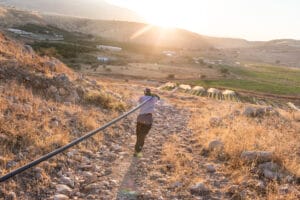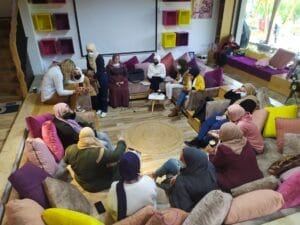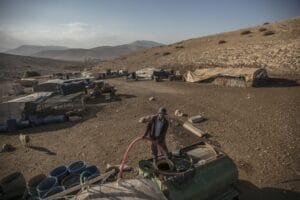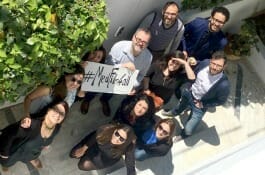
The project is an urgent emergency response aiming at improving the living conditions of highly vulnerable and deeply under-served Palestinian…
Discover moreWeWorld has been present in Palestine since 1992. A presence that has been renewed and adjusted, year after year, to meet new solutions to a long-term crisis with the aim of activating development processes that go beyond the emergency.
Our intervention is aimed at promoting the full inclusion of both the resident Palestinians of the Area C and those living in the Gaza Strip, promoting new forms of social and territorial cohesion that can mitigate the depressive impact, in terms of human, social and economic development, which is a consequence of the fragmentation imposed by the occupation.
We were one of the first humanitarian organisations to sign the operational framework agreement for the implementation of emergency projects in 1993, the day after the establishment of DG ECHO, the Directorate-General for European Civil Protection and Humanitarian Aid Operations.
With the first health interventions involving the basic community organisations, in 1997 we built the first blood transfusion centre in the Gaza Strip, which is still operational, in collaboration with the Central Blood Bank of Gaza.
From that date onwards the partnership with the European Union for the creation of projects of cooperation aimed at mitigating the permanent humanitarian crisis consolidated in the years has allowed us to carry out humanitarian projects in the South of the West Bank and in the Gaza Strip.
Together with our local partners we have identified the difficulty of accessing water resources as one of the most urgent critical issues and in recent years we have built and restored more than 750 cisterns within the community and schools; we have built and restored over 150 wells and springs; we have renovated tens of kilometres of rural roads to ensure connections between the communities and reduce the costs of water distribution for areas not reached by water networks; in addition, we have built tens of kilometres of aqueducts to connect the communities not yet served.
Furthermore, all our interventions are accompanied by awareness-raising and capacity-building campaigns, in order for the beneficiaries to manage all the infrastructures built in an autonomous, sustainable and efficient way in the shortest possible time.
Since the early years, our intervention in the occupied Palestinian territories, as well as that of our partners, has been to guarantee the Palestinian communities of these areas the coverage of all the basic primary needs.
An intervention that has been renewed and adjusted, year after year, to meet new solutions to a long-term crisis with the aim of activating development processes that go beyond the emergency.
The project is an urgent emergency response aiming at improving the living conditions of highly vulnerable and deeply under-served Palestinian…
Discover moreApproximately 2.5 million Palestinians are in need of humanitarian assistance due to the protracted protection crisis in the oPt. The…
Discover moreThe three-year project implemented in the West Bank and Gaza Strip promotes gender equality, the economic empowerment of women, and…
Discover moreThe inhabitants of the three rural communities in the target area are highly affected by policies and practices that hinders…
Discover moreFive countries joined forces to boost wastewater reuse in agriculture. We are implementing a component of the project in Palestine,…
Discover moreThe project objective is to strengthen accountability and democratic participation in Salfit areas promoting and enhancing meaningful engagement of youth…
Discover moreCitizens residing in area C of the West Bank are experiencing increasing restrictions in accessing land and natural resources and…
Discover morePalestinian communities in the West Bank are victims of threats and violations of their Gender, which leads them to a…
Discover moreThe Palestinian economy’s growth rate has declined sharply in recent years because of the severe restrictions imposed by Israel and…
Discover moreAmong the target Countries there are many differences and different degrees between them in terms of how much and how…
Discover moreThe project aims to ensure access to basic Wash need for the most vulnerable people living under Israeli occupation, in…
Discover moreThe blocking of access to the Gaza Strip had already created strong issues regarding the access to water and the…
Discover more









